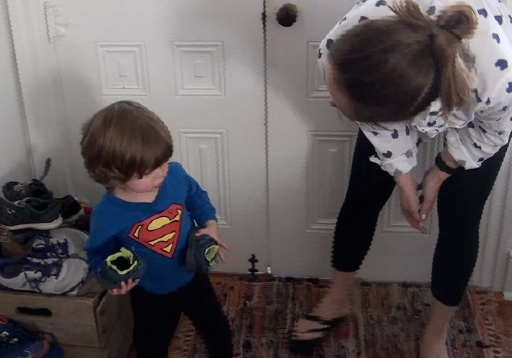
Stress is very real for babies and toddlers. They are very sensitive and very aware of their environment. When the adults who care for them are overwhelmed or stressed, that transfers to the child and causes them to feel stress. There is normal, everyday stress that comes from keeping a tight schedule, occasional frustrations and feeling overwhelmed. There is also toxic stress which is ongoing stress that is usually related to more severe circumstances such as illness, extreme poverty, abuse, homelessness, or some sort of trauma. When a baby or toddler is exposed to toxic stress, it can have profound effects on his development and behavior. The Amygdala is located in the temporal lobe of our brain and it plays a key role in processing emotions. It is strongly affected by stress because it matures early in life and it plays an important role in a child’s learned response to stress and fear.
It is important to try to minimize your stress as a parent so you do not pass that on to your child. Try to ask for help from family and friends, take advantage of resources in your community and seek professional help if needed. Know that your child is intuitive and will pick up on it and it can affect his development. Try to decrease stress in your toddler’s life by:
- Talking to him in a quiet, calm voice with a calm facial expression.
- Do not yell or raise your voice.
- Try to be patient.
- Take breaks if needed.
- Surround your toddler with positive role models.
- Make sure your toddler is well-rested.
- Make sure your toddler is well-fed.
- Keep as much structure in your toddler’s life as possible so he knows what to expect.
- Create routines for everyday activities. This is calming to a toddler.
- Some toddlers have a hard time with routines. Always provide a 10 minute warning before a change. For example, “we are leaving the park in 10 minutes.”
- Always make time for bonding every day, maybe by reading a book together or having a cuddle.
- Make your toddler belly laugh several times a day.
References:
Meltzoff, A. N., & Kuhl, P. K. (2016). Exploring the infant social brain: What’s going on in there? ZERO TO THREE, 36(3), 2–9.
National Scientific Council on the Developing Child. (2010). Persistent fear and anxiety can affect young children’s learning and development: Working paper no. 9. Retrieved from http://developingchild.harvard.edu/resources/ persistent-fear-and-anxiety-can-affect-young-childrens-learning-and-development
Center on the Developing Child, Harvard University. (n.d.). Five numbers to remember about early childhood. Retrieved from http://46y5eh11fhgw3ve3ytpwxt9r.wpengine.netdna-cdn.com/wp-content/uploads/2015/06/Five-Numbers-to- Remember-About-Early-Childhood-Development.pdf
Cohen, J., Onunaku, N., Clothier, S., & Poppe, J. (2005). Helping young children succeed: Strategies to promote early childhood social and emotional development. Washington, DC: National Conference of State Legislatures and ZERO TO THREE.

